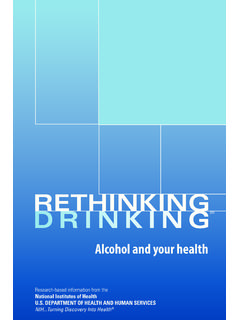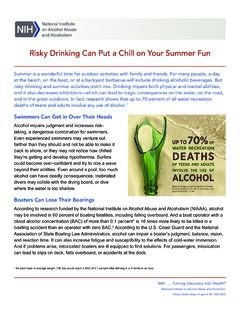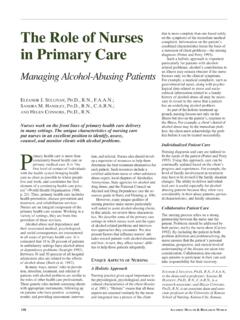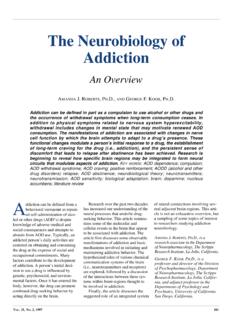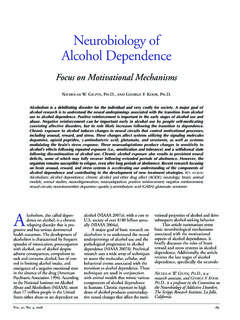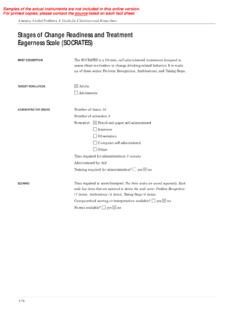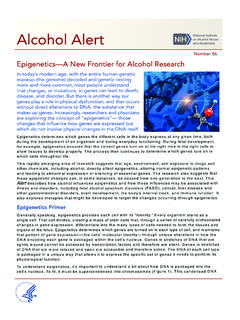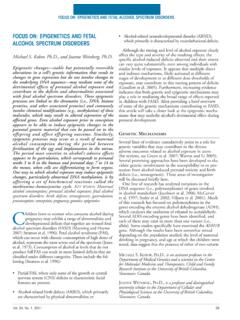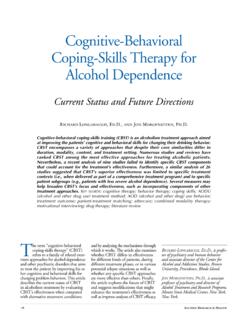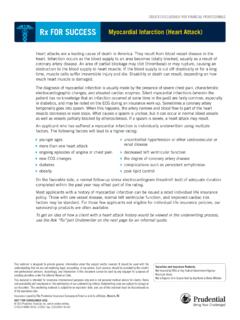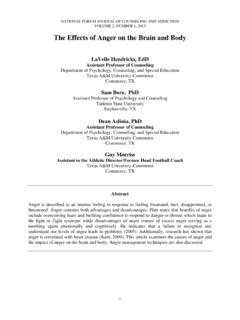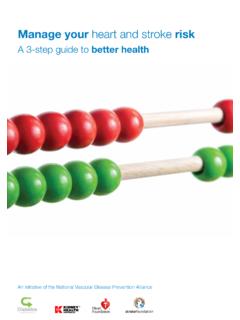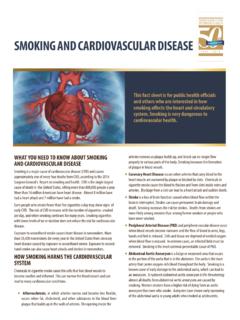Transcription of Complications of Alcohol Withdrawal
1 Complications of Alcohol Withdrawal Pathophysiological Insights Louis A. Trevisan, , Nashaat Boutros, , Ismene L. Petrakis, , and John H. Krystal, Disease processes or events that accompany acute Alcohol Withdrawal (AW) can cause significant illness and death. Some patients experience seizures, which may increase in severity with subsequent AW episodes. Another potential AW complication is delirium tremens, characterized by hallucinations, mental confusion, and disorientation. Cognitive impairment and delirium may lead to a chronic memory disorder ( , Wernicke-Korsakoff syndrome).
2 Psychiatric problems associated with Withdrawal include anxiety, depression, and sleep disturbance. In addition, alterations in physiology, mood, and behavior may persist after acute Withdrawal has subsided, motivating relapse to heavy drinking. Recent advances in neurobiology may support the development of improved medications to decrease the risk of AW Complications and support long-term sobriety. KEY WORDS: AOD. Withdrawal syndrome; disease severity; disease complication; AODR ( Alcohol and other drug related) seizure; delirium tremens; Wernicke Korsakoff psychosis; anxiety state.
3 Emotional and psychiatric depression; sleep disorder; mood and affect disturbance; heart disorder; acute AODE ( Alcohol and other drug effects); AODD ( Alcohol and other drug dependence) relapse; GABA receptors; glutamate receptors; sex hormones; drug therapy;. AOD abstinence; literature review A brupt reduction or total cessa- associated with protracted Withdrawal syndromes and their implications for tion of long-term Alcohol may motivate the patient to relapse to the treatment of Withdrawal . consumption produces a heavy drinking. This article describes well-defined cluster of symptoms the acute Withdrawal syndrome and called acute Alcohol Withdrawal (AW).
4 Its Complications , including seizures, Although some patients experience delirium tremens, Wernicke-Korsa- LOUIS A. TREVISAN, , is an relatively mild Withdrawal symptoms, assistant clinical professor, NASHAAT. koff syndrome, neuropsychiatric disease processes or events that BOUTROS, , is an associate accompany AW can cause significant disturbances, and cardiovascular com- professor, ISMENE L. PETRAKIS, , illness and death. After acute with- plications as well as the protracted is an assistant professor, and drawal has subsided, a poorly defined Withdrawal syndrome.
5 Recent find- JOHN H. KRYSTAL, , is an syndrome of protracted Withdrawal ings are discussed regarding the associate professor in psychiatry at may ensue. The persistent alterations Alcohol -induced alterations of nervous the Department of Psychiatry, Yale in physiology, mood, and behavior system function that underlie these University, New Haven, Connecticut. Vol. 22, No. 1, 1998 61. Acute Alcohol Alcohol detoxifications and the develop- section for a discussion on Wernicke's Withdrawal Syndrome ment of Alcohol Withdrawal compli- syndrome) (Saitz 1995).
6 Death may cations, including seizures, has been occur in up to 5 percent of patients Alcohol Withdrawal is a distinctive ascribed to cumulative long-term with DT's. The risk of death is reduced, clinical syndrome with potentially changes in brain excitability ( , the however, in patients receiving adequate serious consequences (see table) kindling hypothesis) (Ballenger and medication and medical support. (American Psychiatric Association Post 1978; Brown et al. 1988). (For Alcoholics who are awaiting surgical 1994). Symptoms begin as early as further discussion on kindling, see the or medical treatment often exhibit 6 hours after the initial decline from article by Becker, pp.)
7 25 33.) DT's when their Alcohol consumption peak intoxication. Initial symptoms is abruptly interrupted by hospitaliza- include tremor, anxiety, insomnia, tion. Therefore, hospital staff must restlessness, and nausea. Particularly Delirium Tremens remain vigilant for signs and symptoms in mildly Alcohol -dependent persons, of Alcohol Withdrawal , even in patients these symptoms may comprise the DT's are a serious manifestation of alco- not known to be alcoholic. In addition, entire syndrome and may subside with- hol dependence that develops 1 to 4 clinicians must learn to differentiate out treatment after a few days.
8 More days after the onset of acute Alcohol DT's from other possible causes of serious Withdrawal symptoms occur Withdrawal in persons who have been delirium (Alvi and Gonzalez 1995). in approximately 10 percent of patients. drinking excessively for years. Signs of The prediction of complicated alco- These symptoms include a low-grade DT's include extreme hyperactivity of hol Withdrawal is an important part of fever, rapid breathing, tremor, and the autonomic nervous system,1 along alcoholism treatment to ensure that profuse sweating. The time course of with hallucinations.
9 Women experienc- appropriate therapies may be planned Withdrawal is outlined in the figure on ing DT's appear to exhibit autonomic in advance. Risk factors for prolonged p. 63. Seizures may occur in more than symptoms less frequently than men. or complicated Alcohol Withdrawal 5 percent of untreated patients in acute Co-occurring medical problems may include lifetime or current long dura- Alcohol Withdrawal . Another severe com- obscure the diagnosis and treatment tion of Alcohol consumption, lifetime plication is delirium tremens (DT's), of DT's or worsen the outcome.
10 Such prior detoxifications, prior seizures, which is characterized by hallucinations, medical problems include altered blood prior episodes of DT's, and current mental confusion, and disorientation. chemistry, certain infections, and intense craving for Alcohol (Saitz 1995). The mortality rate among patients Wernicke's syndrome (see the following Certain clinical and biochemical findings exhibiting DT's is 5 to 25 percent. Seizures Diagnostic Criteria for Alcohol Withdrawal1. 1. Cessation of or reduction in Alcohol use that has been heavy or Withdrawal seizures usually consist of prolonged.)
